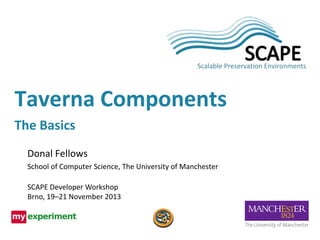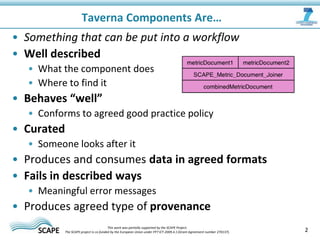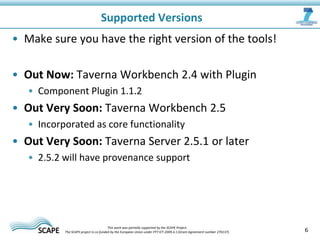Taverna Components: The Basics
- 1. Taverna Components The Basics Donal Fellows School of Computer Science, The University of Manchester SCAPE Developer Workshop Brno, 19ŌĆō21 November 2013
- 2. Taverna Components AreŌĆ” ŌĆó Something that can be put into a workflow ŌĆó Well described ŌĆó What the component does ŌĆó Where to find it ŌĆó Behaves ŌĆ£wellŌĆØ ŌĆó Conforms to agreed good practice policy ŌĆó Curated ŌĆó Someone looks after it ŌĆó Produces and consumes data in agreed formats ŌĆó Fails in described ways ŌĆó Meaningful error messages ŌĆó Produces agreed type of provenance This work was partially supported by the SCAPE Project. The SCAPE project is coŌĆÉfunded by the European Union under FP7 ICTŌĆÉ2009.4.1 (Grant Agreement number 270137). 2
- 3. Components Model ŌĆó Implemented by Workflows ŌĆó Collect Components in Families ŌĆó Groups similar components together ŌĆó Families share common Profile ŌĆó Defines what it means to be a family member ŌĆó Profiles inherit from Base Profile ŌĆó Defines semantics of workflows and standard annotations ŌĆó Store in a Registry ŌĆó We use myExperiment as the shared Registry ŌĆó Use a local registry on your filesystem when developing new components This work was partially supported by the SCAPE Project. The SCAPE project is coŌĆÉfunded by the European Union under FP7 ICTŌĆÉ2009.4.1 (Grant Agreement number 270137). 3
- 4. Component Architecture This work was partially supported by the SCAPE Project. The SCAPE project is coŌĆÉfunded by the European Union under FP7 ICTŌĆÉ2009.4.1 (Grant Agreement number 270137). 4
- 5. Finding Components Within Taverna Online on myExperiment This work was partially supported by the SCAPE Project. The SCAPE project is coŌĆÉfunded by the European Union under FP7 ICTŌĆÉ2009.4.1 (Grant Agreement number 270137). 5
- 6. Supported Versions ŌĆó Make sure you have the right version of the tools! ŌĆó Out Now: Taverna Workbench 2.4 with Plugin ŌĆó Component Plugin 1.1.2 ŌĆó Out Very Soon: Taverna Workbench 2.5 ŌĆó Incorporated as core functionality ŌĆó Out Very Soon: Taverna Server 2.5.1 or later ŌĆó 2.5.2 will have provenance support This work was partially supported by the SCAPE Project. The SCAPE project is coŌĆÉfunded by the European Union under FP7 ICTŌĆÉ2009.4.1 (Grant Agreement number 270137). 6
- 7. Making a Component 1. Decide what you want to doŌĆ” ŌĆó ŌĆ£Combine measures documentsŌĆØ 2. Create a workflow to do it ŌĆó DonŌĆÖt forget to annotate! 3. Turn it into a component 1. ŌĆ£ComponentsŌĆØ Menu 2. ŌĆ£Create componentŌĆ”ŌĆØ 3. Choose registry, family and name ŌĆó You may need to create a family (see next slide) 4. Any final adjustments before publication? Do now 5. Save component, providing a description 4. If it is public, share component with SCAPE via myExperiment website This work was partially supported by the SCAPE Project. The SCAPE project is coŌĆÉfunded by the European Union under FP7 ICTŌĆÉ2009.4.1 (Grant Agreement number 270137). 7
- 8. Creating a Component Family 1. ŌĆ£ComponentsŌĆØ ’āĀ ŌĆ£Create familyŌĆ”ŌĆØ 2. Select registry and profile TIP: You can create profiles from the ŌĆ£ComponentsŌĆØ menu by importing them from myExperiment 3. Provide a name and description 4. If it is a family on a public repository, set the sharing policy and license 5. If you want to share your family with SCAPE, you do that via the myExperiment web interface TIP: Try to avoid creating families unless thereŌĆÖs a functional reason This work was partially supported by the SCAPE Project. The SCAPE project is coŌĆÉfunded by the European Union under FP7 ICTŌĆÉ2009.4.1 (Grant Agreement number 270137). 8
- 9. Using a Component ŌĆó Import the Family into service panel ŌĆó ŌĆ£Import new servicesŌĆØ ŌĆó ŌĆ£Component serviceŌĆ”ŌĆØ ŌĆó Pick registry and family ŌĆó See that family members are now available ŌĆó Drag the component across (or right-click and ŌĆ£addŌĆØ from menu) to add to your workflow TIP: Private components will not be usable by others or by the execution platform (got to read the component definition to run it!) This work was partially supported by the SCAPE Project. The SCAPE project is coŌĆÉfunded by the European Union under FP7 ICTŌĆÉ2009.4.1 (Grant Agreement number 270137). 9
- 10. Updating a Component ŌĆó Open the component ŌĆó ŌĆ£ComponentsŌĆØ ’āĀ ŌĆ£Open componentŌĆ”ŌĆØ ŌĆó Edit the component ŌĆó Save (either normally or via ŌĆ£ComponentsŌĆØ menu) ŌĆó Provide description of version ŌĆó Tell workflows to use new version ŌĆó Right-click ’āĀ ŌĆ£Configure componentŌĆ”ŌĆØ ŌĆó Pick the version to use ŌĆó TIP: They do not update automatically This work was partially supported by the SCAPE Project. The SCAPE project is coŌĆÉfunded by the European Union under FP7 ICTŌĆÉ2009.4.1 (Grant Agreement number 270137). 10
- 11. Open Issues ŌĆó SPARQL searches not exposed in plugin ŌĆó TheyŌĆÖre there in myExperiment, but too hard to use for most users so that UI is switched off ŌĆó Full semantic annotation not exposed ŌĆó Gets very problematic when dealing with FOAF annotations for creators ŌĆó Profile validation not complete ŌĆó No true interface for creating profiles ŌĆó Just importing already existing profile documents ŌĆó Many features wanted by other projects are missing This work was partially supported by the SCAPE Project. The SCAPE project is coŌĆÉfunded by the European Union under FP7 ICTŌĆÉ2009.4.1 (Grant Agreement number 270137). 11











